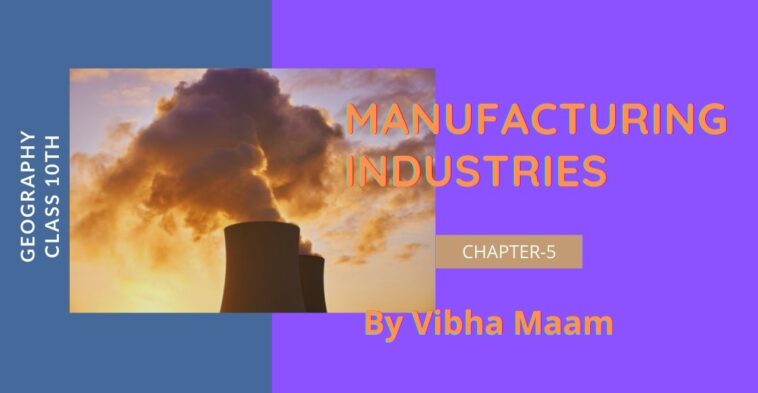Checkout handpicked notes of NCERT class 10th Geography Chapter 5 Manufacturing Industries notes by Vibha Madam and don’t forget to share your valuable comments in the comment below to motivate our author.
Manufacturing Industries Notes by Vibha Maam
Manufacturing
The process of converting raw material into finished goods in large quantities that meet the requirements of customers is called manufacturing, e.g., paper from wood, aluminium goods from bauxite etc.
Importance of manufacturing
- Manufacturing sector is the backbone of economic development.
- It reduces dependence on agriculture.
- It provides jobs and eradicates poverty.
- It reduces regional disparities in terms of development.
- It expands trade and commerce and brings foreign exchange.
- It increases the prosperity of the country.
Contribution of industry to the National Economy
- Manufacturing industries help in modernising agriculture.
- Agriculture and industry go hand in hand. •Agriculture provides raw material to industries while Industries help in raising the productivity of agriculture.
- With appropriate policy, intervention of the government and renewed efforts by the industry to improve productivity.
Factors contributing to the location of industries
a) Physical Factors
- Raw material
- Water
- Power resources
- Climate
b) Human Factors
- Labour
- Market
- Transport
- Capital
- Government Policies
Classification of industries
a) based on raw material
Heavy – Iron and steel
Light – electrical
b) based on capital
Large scale
Small scale
c) based on ownership
Private sector – TISCO, Bajaj Auto
Public sector – BHEL, SAIL
Joint sector – Oil India Ltd (OIL)
Co-operative sector- sugar industry
d) based on source of raw material
Agro-based – Textile industry
- The first textile mill was established in Mumbai in 1854.
- The first jute mill was set up near Kolkata in 1855 at Rishra.
- About 60% of sugar Mills are in Uttar Pradesh and Bihar.
Mineral- based
- Chhota Nagpur plateau region has the maximum concentration of iron and steel industries.
- Aluminium smelting is the second most important metallurgical industry in India.
- Cement industry needs bulky and heavy raw materials like limestone, silica and gypsum.
- Foreign Direct Investment ( FDI) brought in new technology and aligned the automobile industry with global development .
- Bengaluru has emerged as the electronic capital of India.
Industrial Pollution and Environmental Degradation
Air pollution
caused by a high proportion of undesirable gases diffused in the atmosphere by vehicles, industries etc., like sulphur dioxide and carbon monoxide.
- Effect – toxic gas leakage is very hazardous in the long run.
Water pollution
caused by organic and inorganic industrial waste and effluent discharged into rivers.
- Effect – Detoxicated water quality and threat to aquatic life.
Thermal pollution
draining of hot water from factories and power plants into the rivers before cooling, contaminates groundwater.
- Effect – causes birth defects, cancer
Noise pollution
caused by unwanted sounds from industrial and construction activities and equipment.
- Effect – causes hearing impairment, increased heartbeat rate, blood pressure and other psychological disorders.
Control of environmental degradation
- Minimise water use
- Rain water harvesting
- Reuse and recycling
- Water treatment
- Use of effective technique to reduce degradation
Treatment of industrial effluents
Treatment of industrial effluents can be done in three phases:-
- Primary treatment by mechanicals means screening, grinding, flocculation and sedimentation
- Secondary treatment by biological process planting trees, increasing grass cover, rainwater harvesting
- Tertiary treatment by biological, chemical and physical processes, recycling of waste water.
Industrial pollution can be checked
- Through overdrawing of groundwater reserves by industry and should be regulated legally.
- Particulate matter in the air can be reduced by fitting smoke stacks to factories.
- Smoke can be reduced by using oil or gas instead of coal in factories.
- Machinery and equipment can be used and the generator should be fitted with a silencer .
- Noise absorbing material may be used apart from personal use of earplugs and earphones.
Conclusion
The challenge of sustainable development requires integration of economic development with environmental concerns.
NTPC has ISO 14001 certification for Environment Management System. The corporation has a proactive approach for preserving the natural environment and resources like water ,oil ,gas and fuels in places where it is setting up power plants.
Don’t forget to comment in the comment section below to appreciate and motivate our author by sharing this notes with your friends you can also Contact us for any query or if you are interested in writing with us.
Use Canva for amazing images.
Stay tuned for more amazing stories, poems & articles like this.
For sponsor any article or your article you can mail us with your logo ready and details.











thanks maam for your kind support
thanks maam for awesome notes
Thank you so much for providing these sufficeint notes😊😊📝📝
thanks maam
thanks maam